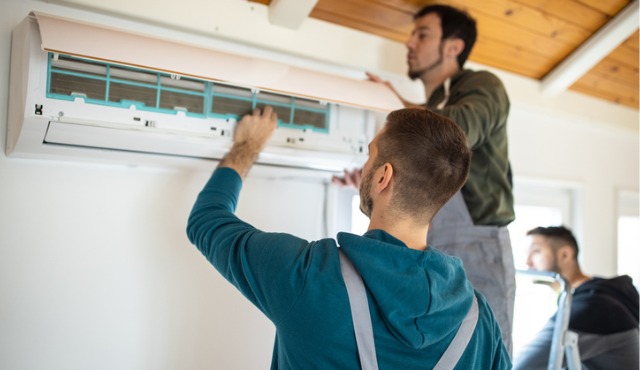By Hannah Whittenly
Is your air conditioner not providing the same level of cool comfort that it once did? If so, you may be worried about needing to have costly repairs or expensive replacements done. Fortunately, there are a few simple steps you can take that can help keep your AC unit running smoothly and efficiently and save you from unnecessary repair costs in the future. In this blog post, we'll provide 3 essential tips to prevent the need for air conditioning repairs and ensure your home stays cool all summer long.
Clean or Replace the Air Filters Regularly
Regularly cleaning or replacing your air filters is essential for keeping your home comfortable and healthy. Not only does this help maintain optimal airflow and efficiency, but it also reduces the amount of allergens and dust circulating in the air.
Whether you have a furnace or an air conditioner, the air filter plays a crucial role in keeping your home climate regulated. It works by trapping dust, pollen, and other airborne particles as air passes through the filter. Over time, the filter becomes clogged with accumulated debris, which can then reduce the air flow and cause your system to run less efficiently.
Replacing your air filters regularly will ensure that your air conditioning and heating systems are operating at their peak performance. This can help reduce your energy costs while also protecting your home from indoor air pollutants. Additionally, if you have allergies, regularly changing the air filter can help reduce your symptoms by removing allergens from the air.
The frequency of filter replacement depends on the type of filter you have. Generally speaking, disposable fiberglass filters should be replaced every three months, while pleated and electrostatic filters can last up to six months before needing to be replaced. To maximize the lifespan of your filter, it is important to remember to clean or replace it regularly.
By cleaning or replacing the air filter regularly, you can ensure that your home is a healthy and comfortable environment. Not only will this help reduce allergens and dust, but it will also keep your air conditioning and heating systems running efficiently, saving you money in the long run.
Check the Thermostat Settings
Checking your thermostat settings is an important part of maintaining a comfortable environment in your home. Not only does it help you save money on energy bills, but it’s also important for ensuring the longevity of your air conditioning unit.
The optimal temperature setting for an AC unit is 78 degrees Fahrenheit. This temperature is comfortable for most people, and is also energy-efficient. Setting the temperature to a lower level runs the risk of overworking the AC unit and leading to costly repairs or replacements.
It is also recommended to set the thermostat to a higher temperature when you’re away from home for extended periods of time. This helps conserve energy and reduces strain on the AC unit.
It is important to check your thermostat settings at least once a month to make sure that the temperature is set to an appropriate level. If you notice that the temperature is too low, make sure to adjust it to a more reasonable setting.
In addition to checking the thermostat settings, it is also important to make sure that your air conditioning unit is properly maintained. This includes cleaning or replacing the air filter, clearing debris and dust from the vents, and doing any necessary repairs.
By following these simple tips, you can ensure that your air conditioning unit is running efficiently and that the temperature is set to a comfortable level. Taking the time to check your thermostat settings and maintain your AC unit will help you save money in the long run and keep your home comfortable all year round.
Have Regular Maintenance Done by an HVAC Specialist
Regular maintenance of your home’s HVAC system is crucial for optimal performance and energy efficiency. It is important to have an HVAC professional come to your home annually to inspect, clean, and maintain your system. The HVAC professional can diagnose any possible issues before they become major problems, saving you money on future repairs or replacements down the road.
When the HVAC specialist arrives at your home, they will thoroughly inspect your system, checking for any signs of wear and tear and replacing any broken or worn components as necessary. They will also check your system for cracks or leaks that can affect its efficiency. The specialist will also inspect the ductwork for any signs of debris buildup, which can reduce airflow and lead to a decrease in efficiency.
The HVAC specialist will also check the thermostat settings and make any necessary adjustments to ensure the system is running optimally. They will also clean and lubricate any moving parts, as well as check and calibrate the system’s controls to prevent any potential problems.
Finally, the HVAC specialist will provide advice on how to keep your system running efficiently. This may include recommendations for improved insulation, proper air filter replacement, and airflow optimization. These steps can help you save money on energy bills and reduce the possibility of future repairs.
In conclusion, regular maintenance of your home’s HVAC system is essential for its optimal performance and energy efficiency. An HVAC specialist can diagnose any possible issues before they become major problems, saving you money on future repairs or replacements down the road. By following their advice and taking proactive measures, you can ensure your HVAC system is running at its peak performance and you’re able to save money on energy bills.
 My name is Hannah, I am a freelance writer from Sacramento California and a mother of 2. I enjoy writing on blogs of all niches.
My name is Hannah, I am a freelance writer from Sacramento California and a mother of 2. I enjoy writing on blogs of all niches.








